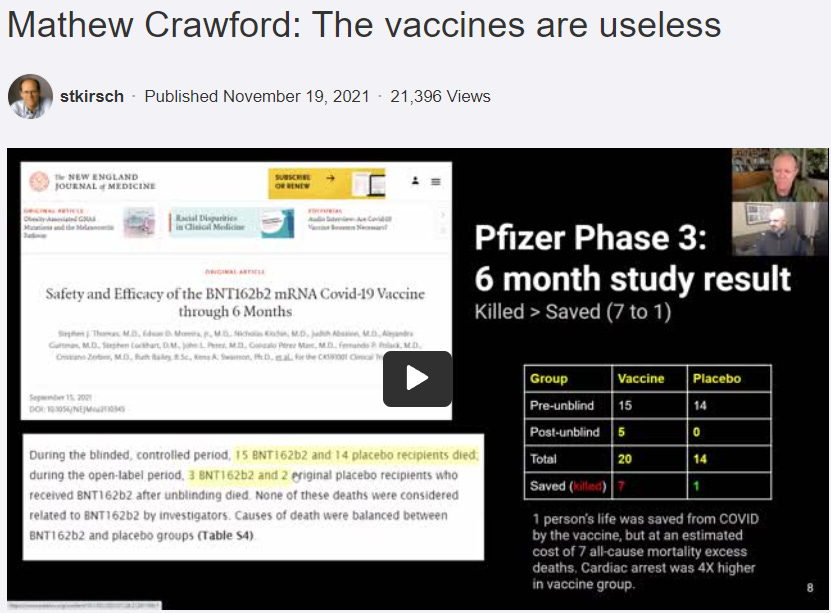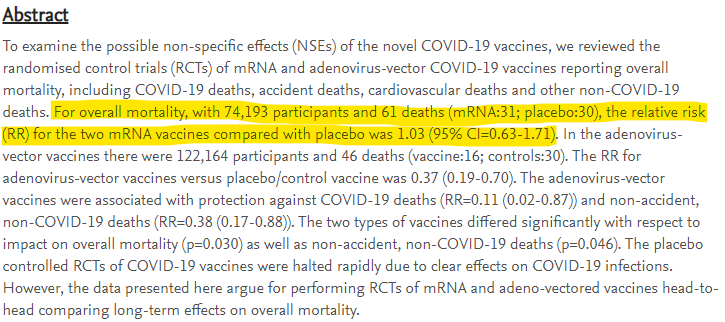"Men are so simple and so much inclined to obey immediate needs that a deceiver will never lack victims for his deceptions." -Niccolo Machiavelli
For nearly a year I've been doing my best to call attention to what I call the Efficacy Illusion with respect to many or all of the experimental COVID-19 ["maybe we can get away with calling them"] vaccines. I summarized much of that work in my VRBPAC talk a few weeks ago.
In mid-November, I was homeless living out of a hotel room after my apartment was completely flooded, and losing (a lot of) sleep to get a bit of work done/saved/completed, and I asked Steve Kirsch to go ahead and interview me on all the data I had collected. My statement: "The vaccines are useless."
Even then, I had been trying to bring attention to the data for months and to urge those with larger platforms to review the work or reconstruct it from scratch. I don't care who publishes it, ultimately. It's just important that the world find out: the efficacy claims are one giant fraud.
The Danish Evaluation of RCTs of COVID-19 Vaccines
It makes me icky writing that article subsection heading. Not all of these so-called vaccines are vaccines, and not all of the self-described RCTs were actually RCTs. Some or all of the mRNA vaccine trials failed (intentionally) to even perform tests on all the subjects who reported COVID symptoms, participation failed to span the vast majority of the categories of people who are at serious risk from COVID, data was falsified, trials were prematurely unblinded, and after 17 months data exclusions that overwhelm effect sizes still haven't been explained. But perhaps the most pernicious fiction that most people fail to note or emphasize is that these quasi-vaccines do not even claim to prevent COVID—they just claim to prevent COVID caused by SARS-CoV-2. This is as close as you're going to get to a direct admission that the developers are perfectly aware that the spike protein is itself a large part—if not the primary source—of the COVID pathogenesis.
I called for discussion of Type II COVID-19 on June 11 of last year.

We still haven't seen a proper discussion on the topic, but the Danish study we're about to look at gets us a little bit closer, even without direct discussion.
That's enough backstory. Let's take a look at this new study that is currently in preprint (Benn et al, 2022).
Note that this result flatly contradicts the Vaccine Safety Datalink research published by the CDC, thus lending greater credence to my theory that efficacy observations in retrospective studies are all due to statistical sieves.
When expanding the examination of mortality beyond categorical COVID-19, we find that the risk of mortality was unchanged for mRNA vaccines. If the mRNA vaccines are effective (at something), how could this result be possible? Here are a few possibilities:
The mRNA vaccines are only effective as suppressing symptoms in patients low enough on risk scales that COVID-19 wasn't ever going to be a serious concern. That would be to say that the so-called RCTs were entirely inappropriate for the task of testing based on the chosen demographics.
COVID-19 is too small a proportion of all-cause mortality to worry about, meaning there is not a serious enough health crisis to warrant rushed mass experimentation.
They don't Pfriggin work to stop COVID-19—just those cases caused by the SARS-CoV-2 virus.
Harvard epidemiologist Martin Kulldorff weighs in on the study, pointing out that while in preprint, he has personally (peer) reviewed it. Most of his commentary is similar to mine, though he is…more kind than I am when referring to the mRNA trials as RCTs:
The strength of the Danish study is that it is based on randomized controlled trials. The primary weakness is that the follow-up time is short. This is because the manufacturers ended the clinical trials prematurely, after the vaccines received emergency use authorization.
I want to do some meditating on what I think of the reduction of non-COVID, non-accidental mortality suggested by the adenovirus-vector vaccines, which is the one place where I'll hold back in agreement with Kulldorff. I'm uncomfortable imagining that such an injection might stop or delay a lot of causes of death, and I've seen so much evidence of statistical sieves that I take pause here, and would want to examine the raw data before reaching a conclusion. I'd also like to know the contents of the placebos in every trial.
I would love to see something like an international analysis by nation according to which vaccines they used, and what the case and death correlations look like. That's a great deal of work, particularly since most nations seem to have mixed and matched to a point of obscuring such results (intentional?).
Finally, your moment of zen.

We should never [again] allow any conception of government by institutions with conflicts of interest and such perverse incentives.








i have lost complete faith in medicine
Is the J&J trial's randomization credible when 96 placebo recipients "terminated prematurely", but only 49 vaccine recipients did (Fig. S3)? https://www.nejm.org/doi/suppl/10.1056/NEJMoa2101544/suppl_file/nejmoa2101544_appendix.pdf
Oddly, these are almost the same numbers as the people who withdrew from the Pfizer trial after dose 2 (95 vs 48, see Fig. 1). https://www.nejm.org/doi/full/10.1056/NEJMoa2034577
Edit: As Tom suggests below, unblinding errors probably explain the imbalance. I've heard elsewhere that trial participants sometimes figure out which group they are in, and placebo recipients are more likely to withdraw. The odd coincidence of Pfizer and J&J withdrawal numbers (one less per study arm) remains.